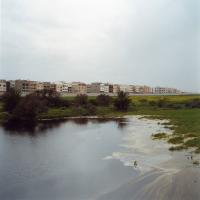 This exhibition addresses the question of cities and their connectivity in the Mediterranean over two radically different time periods. The first section follows a well known historical and geographical sequence through time and space, the Mediterranean of the 16th and 17th centuries, by exploring the connections between six cities (three from the Hapsburg Empire, and three from the Ottoman Empire) which were allied, in opposition, or in a power dynamic of domination. Here the itinerary of the exhibition reflects the geographical space of the Mediterranean : visitors enter in the east by Istanbul, circulate towards Venice and Algiers, before approaching the western part of the Mediterranean, from Genoa to Seville, concluding in Lisbon, the opening to the Atlantic. In the second section, the exhibition presents the cities of the contemporary Mediterranean : two metropolises (Marseille and Casablanca) and two megacities (Istanbul and Cairo).
This exhibition addresses the question of cities and their connectivity in the Mediterranean over two radically different time periods. The first section follows a well known historical and geographical sequence through time and space, the Mediterranean of the 16th and 17th centuries, by exploring the connections between six cities (three from the Hapsburg Empire, and three from the Ottoman Empire) which were allied, in opposition, or in a power dynamic of domination. Here the itinerary of the exhibition reflects the geographical space of the Mediterranean : visitors enter in the east by Istanbul, circulate towards Venice and Algiers, before approaching the western part of the Mediterranean, from Genoa to Seville, concluding in Lisbon, the opening to the Atlantic. In the second section, the exhibition presents the cities of the contemporary Mediterranean : two metropolises (Marseille and Casablanca) and two megacities (Istanbul and Cairo).
I'll visit
15.10.2018 | by vários